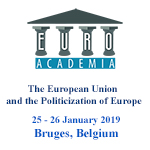Euroacademia Conferences
 Europe Inside-Out: Europe and Europeanness Exposed to Plural Observers (9th Edition) April 24 - 25, 2020
Europe Inside-Out: Europe and Europeanness Exposed to Plural Observers (9th Edition) April 24 - 25, 2020 Identities and Identifications: Politicized Uses of Collective Identities (9th Edition) June 12 - 13, 2020
Identities and Identifications: Politicized Uses of Collective Identities (9th Edition) June 12 - 13, 2020 8th Forum of Critical Studies: Asking Big Questions Again January 24 - 25, 2020
8th Forum of Critical Studies: Asking Big Questions Again January 24 - 25, 2020 Re-Inventing Eastern Europe (7th Edition) December 13 - 14, 2019
Re-Inventing Eastern Europe (7th Edition) December 13 - 14, 2019 The European Union and the Politicization of Europe (8th Edition) October 25 - 26, 2019
The European Union and the Politicization of Europe (8th Edition) October 25 - 26, 2019 Identities and Identifications: Politicized Uses of Collective Identities (8th Edition) June 28 - 29, 2019
Identities and Identifications: Politicized Uses of Collective Identities (8th Edition) June 28 - 29, 2019 The European Union and the Politicization of Europe (7th Edition) January 25 - 26, 2019
The European Union and the Politicization of Europe (7th Edition) January 25 - 26, 2019 7th Forum of Critical Studies: Asking Big Questions Again November 23 - 24, 2018
7th Forum of Critical Studies: Asking Big Questions Again November 23 - 24, 2018 Europe Inside-Out: Europe and Europeanness Exposed to Plural Observers (8th Edition) September 28 - 30, 2018
Europe Inside-Out: Europe and Europeanness Exposed to Plural Observers (8th Edition) September 28 - 30, 2018 Identities and Identifications: Politicized Uses of Collective Identities (7th Edition) June 14 - 15, 2018
Identities and Identifications: Politicized Uses of Collective Identities (7th Edition) June 14 - 15, 2018
The Myth of a Liberal Brexit: How Brexiteers (Mis)Used History in their Quest for British ‘Freedom’
-
-

-
Presentation speakers
- Alistair Somerville, BMW Center for German and European Studies, Georgetown University, USA
- Download presentation
Abstract:
This paper seeks to understand the ways in which members of the Leave campaign, during and since the UK’s 2016 referendum on EU membership, have drawn on historical parallels to mobilise popular support for their position. In light of the narrow margin of victory for Leave, and the prevalence of emotionally-driven arguments, instead of the rational proposals of so-called ‘experts’, it is important to understand the rhetorical tools and imagery of the Leave campaign. As a starting point, this paper references Greg Hall’s observation in his August 2018 article: many of the leading Brexiteers, not least Boris Johnson and Jacob Rees-Mogg, have engaged in the academic study of history. As a result, their campaign rhetoric drew skilfully on themes and images from European history, frequently arguing that Brexit was a logical extension of the cause of British liberalism. This paper argues that this mobilisation of historical myths about a British struggle for freedom against a European oppressor, was a decisive factor in igniting visceral popular support for Brexit, and ultimately crucial in bringing the Leave campaign victory. However, the evocation of such a myth may ultimately serve only to undermine the liberal institutions and alliances in which Britain has participated since the end of the Second World War, not least the transatlantic relationship. Firstly, this paper will provide context and possible parallels for the most recent debates in Britain around its EU membership by grounding anti-EU discourse in the experience of the 1975 EEC referendum. Drawing on posters, other campaign materials from both sides, as well as the work of Fintan O’Toole, the memory of the Second World War emerges as a prominent focal point around which both sides mobilised their arguments in 1975 and today. The paper will draw throughout on media representations of such historical narratives, particularly the evocation of history in the Eurosceptic press. The essay will then develop an analysis of the British war experience as a powerful tool for Brexiteers in 2016, looking in particular at the work of the historian Richard J. Evans, and the weaponization of anti-German/anti-French sentiment.. Such narratives will be compared with the analyses of sociologist Danny Dorling and cultural theorist Kehinde Andrews, who have understood Brexiteers’ use of history through British imperial legacies, and fantasies about partnership with former colonies through the Commonwealth as a replacement for European partnership. Ultimately, this paper seeks to problematize and critique the relationship between the wartime British ‘underdog myth’ and the myth of reviving imperial ties, exposing them as fundamentally incompatible and ultimately inaccurate readings of British history. Throughout, the paper will seek to understand what a “liberal Brexit” actually means, and whether a historical approach can help us to understand such an idea. Lastly, in light of the hostility towards the European project in the historical parallels used by the Brexiteers, the paper will consider whether Britain might turn to other ‘myths’ in future, such as that of the ‘special relationship’ with the United States, or the supposed kinship between the UK and the Commonwealth, as it attempts to rekindle its international partnerships, or whether Brexiteers’ evocation of such historical parallels will ultimately only serve to isolate Britain from its allies.
-
Related Presentations

Politicization of Europe without the Peoples of Europe?
- Carles José i Mestre

Avoiding a Legitimacy Crisis Despite the Quarrels: The EU in the Emissions Trading System Negotiations
- Claire Godet

The Rise of Ethno-nationalist Populism in Slovenia
- Iztok Šori
- Mojca Pajnik













